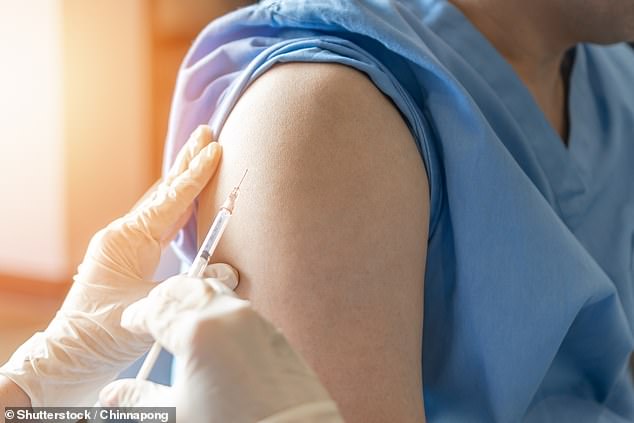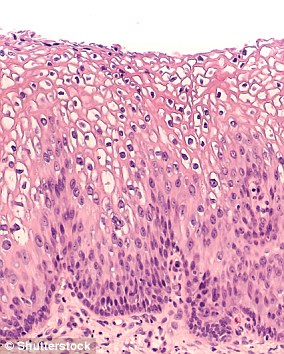According to research, the HPV vaccine could prevent thousands of cases of head and neck cancer among men.
The vaccine, which is offered to all schoolchildren aged 12 and 13, is known to have reduced cervical cancer rates in young women by 90 per cent.
Now, a study involving more than 5 million men and women in the United States found that it more than halved the rates of head and neck cancers.
Receiving the vaccine dramatically reduced rates of head and neck cancers from 6.3 cases to 2.8 cases per 100,000 men.
The HPV vaccine helps protect against human papillomavirus, a common virus spread through skin contact.
The HPV vaccine, offered to all 12- and 13-year-old schoolchildren, cut head and neck cancer rates by more than half, according to a new study.

One study found that the vaccine reduced rates of all HPV-related cancers among men from 7.5 to 3.4 cases per 100,000 and in women from 15.8 to 11.5.
Contracting the virus has been shown to increase the risk of several types of cancer, including those of the cervix, mouth, anus, penis and vagina.
Led by Thomas Jefferson University in Philadelphia, the research involved 5.46 million patients, of whom 949,000 received the vaccine between 2006 and 2008.
It reduced the rates of all HPV-related cancers among men from 7.5 to 3.4 cases per 100,000 and in women from 15.8 to 11.5.
The odds of cervical cancer among women also dropped from 10.4 to 7.4 cases per 100,000, according to findings presented at the American Society of Clinical Oncology’s annual conference in Chicago.
There was no significant decrease in head and neck cancers among women, probably because they are more common among men.
Dr Lawrence Young, an expert in molecular oncology at the University of Warwick, described the data as “very encouraging”.
He said: ‘What we are seeing is the start of what should be an even more significant decline.
«The average age of appearance of these tumors is around 50 years. So in the next few years we will start to see an even more significant reduction.”
The vaccine has been offered to girls in England and Wales since September 2008 before expanding to include boys in 2019.
This has had a “double whammy,” decreasing transmission of the virus through sexual contact and protecting against HPV-related cancers in both sexes.
Experts said it was important to encourage acceptance among eighth graders; the most recent figures put acceptance at 65 per cent compared to 71 per cent for girls.
Professor Young suggested better public health messaging was needed to promote the full benefits of the vaccine, rather than it being seen as a vaccine against cervical cancer.
He said: “I think there is very little understanding or appreciation of the impact of HPV on oral cancer, people haven’t heard of it.” It’s still relatively new.
“We need to get that message out to young people in the UK, telling them that this is a virus also associated with head and neck cancer and (the vaccine can) prevent you from getting it as you get older.”

Contracting the virus has been shown to increase the risk of several types of cancer, including those of the cervix, mouth, anus, penis and vagina.
Around 12,000 people are diagnosed with head and neck cancer each year in Britain, and rates are expected to rise significantly over the next two decades.
Dr. Glenn Hanna, an ASCO expert at the Dana-Farber Cancer Institute in Boston, said, “We know that the HPV vaccine reduces rates of oral HPV infection.
“But this study shows that, particularly in boys and men, vaccination reduces the risk of HPV-related oropharyngeal head and neck cancers. The HPV vaccine prevents cancer.’



